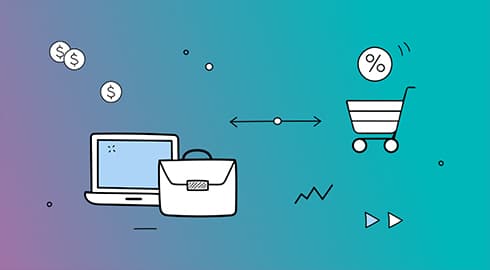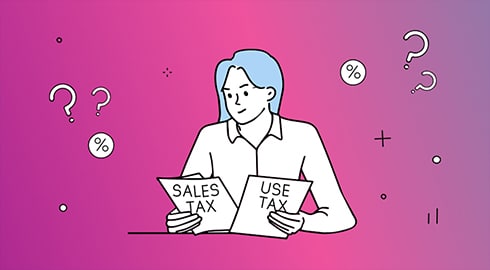SaaS pioneers like Salesforce, Dropbox, and Hubspot were among the first to embrace the subscription model. Today, the subscription model has expanded to cover almost every imaginable product or service, from shaving gear to automated sales tax platforms like Complyt, dedicated to automated sales tax compliance.
No longer a trend, this maturing business model provides a dependable income source to countless US businesses. However, it also introduces complex sales tax implications that no company can ignore.
This article will explore the labyrinth of sales tax on subscriptions and shed light on the ever-evolving landscape so your organization can thrive in a tax-compliant environment.
Why is it essential for subscription-based businesses to address sales tax?
Customer adoption is decelerating, and growth in the US subscription e-commerce market is projected to slow in 2023. Consumers are choosing to have fewer active subscriptions, and dealing with tax complications is an additional burden subscription companies can’t afford.
Let’s delve into how sales tax can create significant challenges, whether you’re an up-and-coming SaaS start-up or a car subscription-based company on the fast track to dominating your market.
1. Sales tax is your legal duty, but it’s far from straightforward
Like all companies, subscription-based businesses are legally obliged to collect and remit sales tax across various jurisdictions. The issue lies in the complexity of staying within legal boundaries.
Federal and state tax laws evolve constantly, demanding continuous attention from businesses. Adding to the complexity, tax regulations and rates differ widely across regions, creating a daunting task for companies serving customers in multiple states.
2. Neglecting sales tax duties can seriously harm financial health
Hefty tax fines and penalties await businesses that neglect their sales tax obligations. Failure to collect the required sales tax and you may be forced to cover these costs from your resources. The punishment can differ depending on where you do business, but it can be substantial. In California, for example, the penalty for failing to collect sales tax can be as high as 10% of the owed tax.
Furthermore, interest accumulates on unpaid sales tax, usually at rates similar to the state’s short-term borrowing rate, and can snowball, especially if you continue not to pay sales tax and comply.
3. It can seriously hurt your reputation
Customer trust is the bread and butter of any subscription-based business. Falling foul of sales tax laws can tarnish a brand’s reputation and be a recipe for losing subscribers.
Moreover, competing businesses that diligently adhere to tax regulations may gain an edge, as customers often prefer to engage with companies that showcase their commitment to legal and ethical practices.
4. The need to stay tax-compliant can drain your resources
Reporting and collecting taxes involves intricate tasks like accurately calculating tax rates, collecting taxes from customers, and precisely reporting and remitting these taxes to tax authorities. The consequences of even minor errors can take large bites out of your bottom line.
Staying compliant requires meticulous attention to detail and establishing efficient systems burdening a company’s operations. Additionally, handling tax issues, audit matters, and potential legal complications consumes valuable time and human resources, further straining a business’s resources.
5. Scalability and expansion
Well done if you’re crushing it in your sector, but you now have a target on your back. As subscription-based businesses grow and expand into new markets, they may encounter a broader range of tax jurisdictions and regulations. Ignoring sales tax can hinder your scaling strategy and create barriers to entry into new markets.
How do I know which of my products and services are taxable?
Do subscriptions have sales tax? Understanding which of your products and services are subject to taxation is crucial for ensuring compliance with state tax laws, as the taxability of subscription-based offerings can vary significantly from one state to another.
As you navigate the complexities of taxation, it’s essential to familiarize yourself with the diverse range of items and services that may or may not be taxable in different jurisdictions.
How do you know? Speaking with a tax consultant or using a comprehensive automated sales tax platform like Complyt is advisable, but let’s unpack this question at a high level.
Services
Is providing services core to your business? They may be subject to sales tax in certain areas if your subscription includes consulting, coaching, or maintenance.
Tangible goods
Suppose your customers subscribe to access physical items, like clothing, books, or electronics, in your subscription box. In that case, it’s essential to know that these products are typically subject to sales tax in most jurisdictions.
Digital products and services
This includes digital audio works and digital downloads of e-books, streaming services, digital audiovisual works, digital games, and software subscriptions and is taxable in many states. Reviewing your jurisdiction’s tax laws is crucial to stay ahead of your tax responsibilities.
Membership and subscription fees
Any membership or other subscription service that grants access to taxable goods or services is typically taxable. For example, if you’re charging a full subscription service or fee, providing access to a digital library of copyrighted materials and digital music is likely subject to tax.
Are there any tax exemptions for subscription-based businesses?
Yes, for example, some states exempt groceries, prescription drugs, and other goods and services from sales tax. Additionally, some states have different rules for calculating sales tax for subscriptions and specified digital products and services.
Let’s zoom in on the most common exemptions and special cases.
Resale exemptions
Some businesses may be exempt from paying sales tax when purchasing items for resale. If you find yourself in this boat, obtaining a resale certificate from customers and maintaining proper documentation is crucial.
Nonprofit exemptions
Nonprofit organizations may be exempt from certain sales tax obligations. But take note this exemption varies by jurisdiction, and not all products and services may be eligible.
Digital product taxation rule
The taxation of digital products is still evolving in many states. Some jurisdictions have specific rules and exemptions for some digital goods and products. If you sell digital goods or products in your organization, it’s wise to put researching the laws in your area high on your to-do list.
Thresholds and nexus
Sales tax obligations may vary based on sales volume and a physical presence (nexus) in a particular taxing jurisdiction. Businesses that meet or exceed certain sales thresholds or have a physical presence in a state may be required to collect and remit sales tax. If this sounds like your company, visit our handy article where we unravel the Gordian knot that is the nexus.
Tax holidays
Some states offer sales tax holidays or holiday tax breaks during specific periods when certain items may be exempt from sales tax. Understanding when these sales tax break holidays occur and which products are eligible for exemption is helpful for any subscription-based business.
Bundled offerings
Does your subscription include both taxable and non-taxable items or services bundled together? You may need to allocate the subscription fee accordingly to determine the taxable portion (and yes, it is as complicated as it sounds).
Analyzing sales tax laws for subscription-based businesses, state-by-state
How can you be sure you know the regulations and sales tax applies to you? The US sales tax system is complex because individual states can establish rules, rates, and exemptions. Navigating subscription-based taxation from state to state can be challenging due to the differences in how states treat subscription services for tax purposes.
Here are some variables to keep in mind:
Taxability of try-before-you-buy subscription
Illinois is the only state that specifically taxes try-before-you-buy subscription services. However, the Illinois Department of Revenue has also determined that try-before-you-buy subscription services are not taxable if there is no transfer of ownership or possession of the product or computer software used as a service.
Tax-exempt subscriptions
Some states consider subscriptions sold as taxable, while others exempt them. For example, nationwide digital subscriptions to streaming services like Netflix may be taxable in some states but exempt in others.
Bundled hardware and software subscriptions
States have differing rules for companies offering bundled services where taxable sales and non-taxable items are offered together, and businesses must divide the subscription fee appropriately. For example, in California, when a bundle includes a cellular phone and wireless service, sales tax is applied to the “unbundled sales price” of the cellular phone.
Sales tax for tangible goods
If your subscription business supplies tangible goods, you will likely need to charge sales tax as if you were selling them to keep your tax status above board.
Tangible vs. digital goods
The emergence of the internet and digital commerce has raised questions about the taxation of intangible, electronically delivered products and services. As a result, states have been adapting their tax laws to address these changes, leading to a patchwork of regulations that can be challenging for businesses to navigate.
Membership fees
The tax treatment of membership fees can vary. Some states may consider them taxable if they provide access to taxable goods or services, while others may exempt them.
Examples of states with notable sales tax variations:
- New York, for instance, taxes digital products like e-books and software while exempting certain digital products for educational purposes.
- Texas is known for having a relatively high state sales tax rate, and it taxes a wide range of services, including some subscription-based services.
- Oregon has no state sales tax, making it an attractive location for businesses that want to avoid tax obligations.
- California has complex sales tax rules, and the state has tried to tax a broader range of services, including some digital services.
The information provided is accurate at the time of writing. However, it’s crucial to seek guidance from professionals knowledgeable about state tax laws to ensure compliance with the regulations in each state where you have customers as these regulations evolve.
How do I calculate and collect sales tax for subscription services?
If you sell digital products, calculating and collecting sales tax on subscription services involves several steps that must be executed with surgical precision. Adding complexity to this operation is its variability, which depends on the jurisdictions you’re trading in and the complexity of your offerings.
Here’s a top-down view of the process.
1. Determine taxability
Start by determining your sales tax obligations in each state where you have customers. This process can be complex even for professionals, as sales tax regulations vary widely from state to state.
2. Identify customer location
Once you know your sales tax obligations, you need to calculate the correct amount of sales tax liability for each transaction. Start by determining the location of your customers, as sales tax rates and rules are based on the customer’s location, not your business’s location. This can be done manually but is time-consuming and prone to errors, especially if you have customers in multiple states.
3. Calculate your tax amount
Once you know your applicable tax rate and your customers’ locations, calculate the sales tax amount based on the subscription price and make sure you’re not under or over charging sales tax. This may involve complex calculations if you offer bundled services or have customers in multiple tax jurisdictions.
4. Collect tax from your customers
When you’ve determined the tax amount, collect it from your customers at the time of the sale. You can do this by adding the total tax rate to the subscription fee for the entire sale or billing it separately in recurring billing only.
5. Record and report your tax details
Keep detailed records of the sales tax you collect sales tax on. Most states require businesses to file regular sales tax returns and remit the collected sales taxes to the appropriate tax authorities. Ensure accurate record-keeping to facilitate these filings.
6. Keep tracking and monitoring
You’ve established your sales tax collection process for subscription services, but it’s not over yet. To ensure you comply with state tax laws, keep tracking transactions across states to see if you’ve surpassed the thresholds in each state (remember Nexus?) In this case, you may need to file sales tax returns, and remit collected sales taxes elsewhere. Additionally, sales tax laws are evolving constantly, so that should always be on your tax radar.
Conquer sales tax with Complyt
Tax automation platforms like Complyt can help fulfill your tax obligations on autopilot and minimize the risk of costly mistakes and audit risks.
No matter what or where you’re selling subscriptions from, Complyt is designed to scale with you and calculate your tax obligations accurately down to the last cent.
How else can Complyt ensure this is the last time you ever have to read a blog about sales tax compliance again?
1. Complyt determines the tax rates you need to pay in seconds
Experience the speed and accuracy of Complyt in managing your sales tax. Instantly calculate the precise tax rates according to your customers’ locations, apply for exemptions when needed, and generate detailed sales tax breakdowns for each transaction with no fuss.
2. Real-time tax calculation? Check.
Complyt provides real-time tax rate updates in a few clicks, ensuring that your organization complies with the ever-changing tax regulations and rates across all 50 states.
3. Reporting and compliance
Our SaaS platform generates accurate sales tax reports and assists with filing and remitting sales taxes to the relevant tax authorities, shouldering the administrative burden for your organization.
4. Reconciliation
Before filing, Complyt assists in reconciling collected sales tax with business records. Any discrepancies are highlighted and can be addressed and corrected to ensure the accuracy of filings.
5. Methods of reporting
Complyt simplifies the reporting process by offering multiple filing options. It can generate paper returns where applicable, but it strongly encourages and facilitates electronic filing, which is often more efficient and, in some cases, mandatory. Additionally, Complyt integrates with state tax portals for streamlined electronic filing.
6. Tax software integration
Complyt integrates with accounting systems and billing software, automating the reporting data processing and filing process. This integration minimizes the risk of errors and ensures accurate reporting.
7. Record keeping
Complyt emphasizes the importance of maintaining detailed records of all sales tax transactions, including customer information and transaction amounts. These records are essential for reconciling sales tax returns and addressing audit requirements.
8. Payment methods
Complyt helps businesses stay compliant by providing information on various payment methods accepted by states, such as electronic funds transfer (EFT), credit card payments, and checks. It guides businesses in making payments per state guidelines.
9. Timely filing
Complyt aids in adhering to filing deadlines for each jurisdiction. It sends timely reminders to ensure that businesses file their returns promptly, reducing the risk of penalties and interest charges due to late filings.
10. Integration with payment systems
Book a demo today to see how Complyt unifies tax calculation, data processing, and collection by seamlessly integrating with your ERP systems and existing accounting software.
FAQ
Are subscriptions taxable?
The taxability of subscriptions varies from state to state. Some states may subject try-before-you-buy subscription services to sales tax, while others may not. Understanding the taxability of your subscriptions in each state where you have customers is essential to ensure compliance with state tax laws.
Are subscriptions tangible personal property?
Subscriptions are generally not considered tangible personal property. However, if a subscription includes tangible personal property, such as a physical product, the subscription may be subject to sales tax as if it were selling tangible personal property.
Is the subscription-based model a taxable service?
The subscription-based model may or may not be a taxable service, depending on the state and the nature of the subscription model. Some subscriptions include services that may or may not be taxable services, and it is essential to understand if the state would see the bundled fee as a taxable service.
How do I know if I’m overcharging sales tax?
To avoid this, it is vital to understand the taxability of your subscriptions in each state where you have customers. Consider consulting with a tax professional or using a cloud-based accounting tool to automate calculating and collecting sales tax.
In which states are subscriptions-based services tax-free?
In the United States, the taxability of services, including subscription-based services, can vary from state to state. While many states do not tax services, some do, and the specifics can depend on the nature of the service or product being sold. Given this complexity and the potential for tax laws to change, consulting with a tax professional is recommended to understand each state’s specific tax obligations for subscription-based services.
Do subscription-based businesses have to pay gross receipts tax?
The requirement to pay gross receipts tax varies from state to state. Some states may require subscription-based businesses to pay gross receipts tax, while others may not. Understanding the tax laws in each state where you have customers is essential to ensure compliance with state tax laws.
Does Florida sales tax apply to SaaS companies?
Florida generally does not require sales tax on Software-as-a-Service (SaaS). However, if the subscription-based purchase of taxable tangible personal property is made online and delivered to a customer located in Florida, it is subject to Florida sales tax. If the seller is registered as a Florida dealer, they should collect Florida sales tax.









